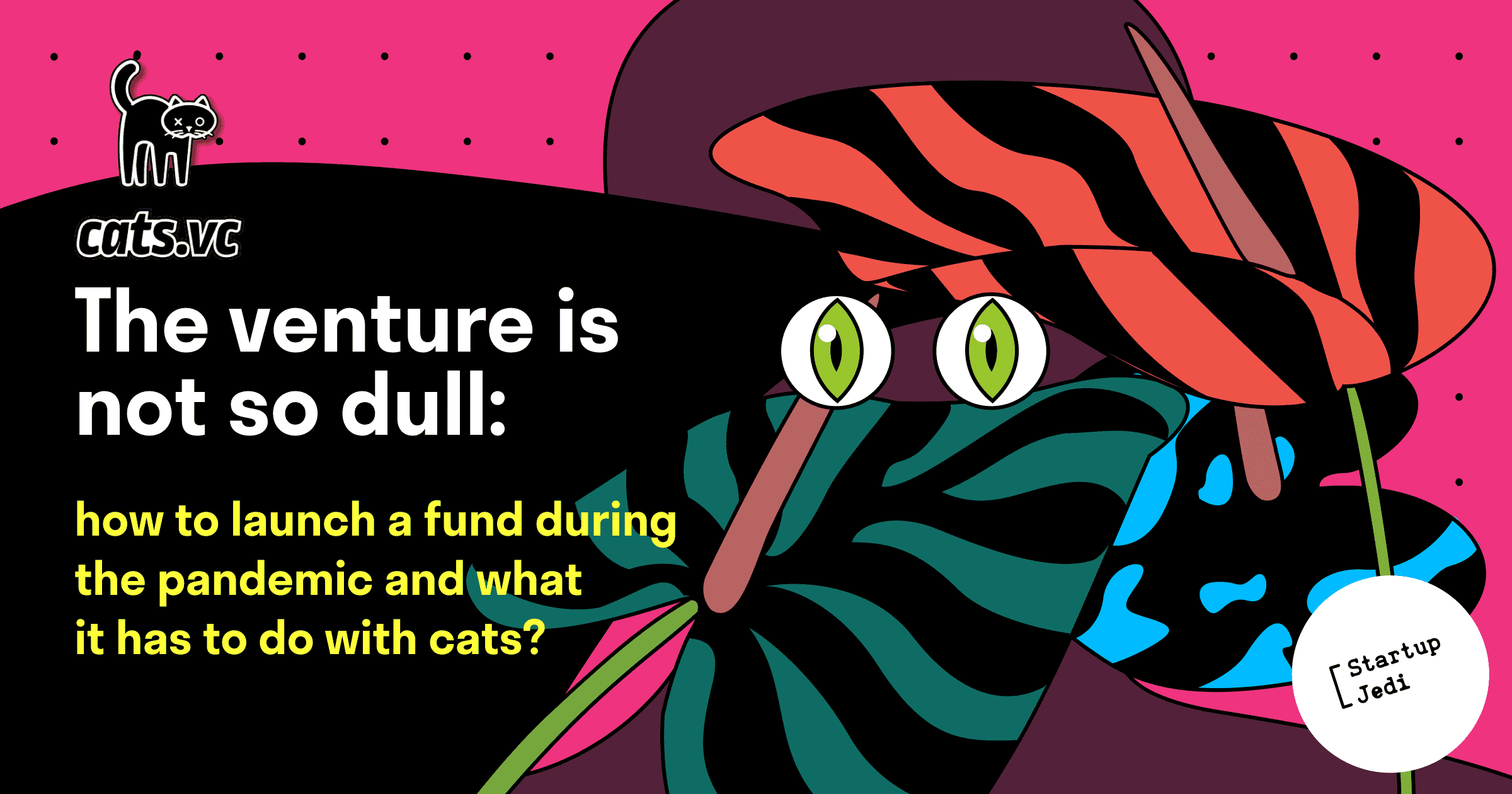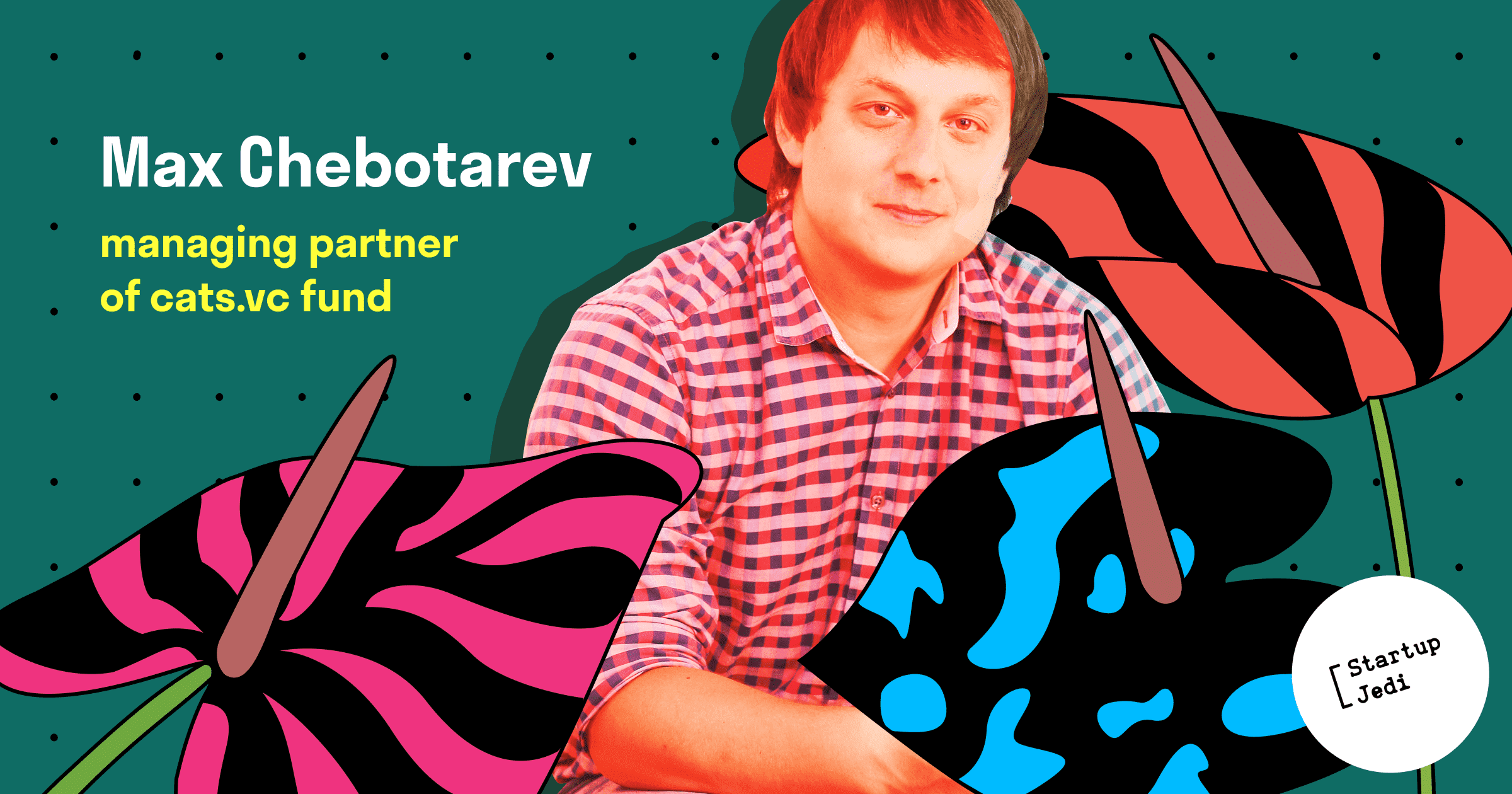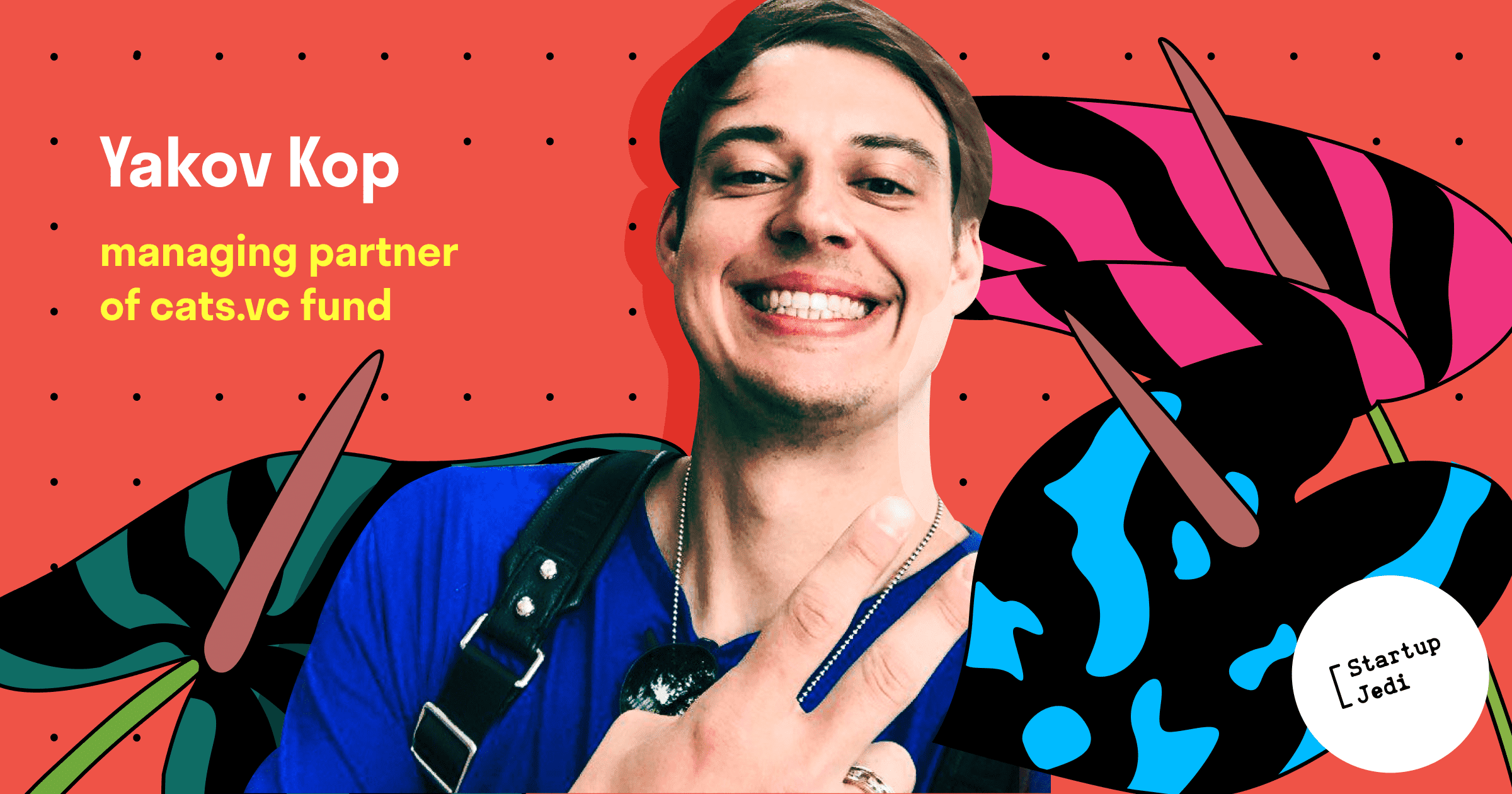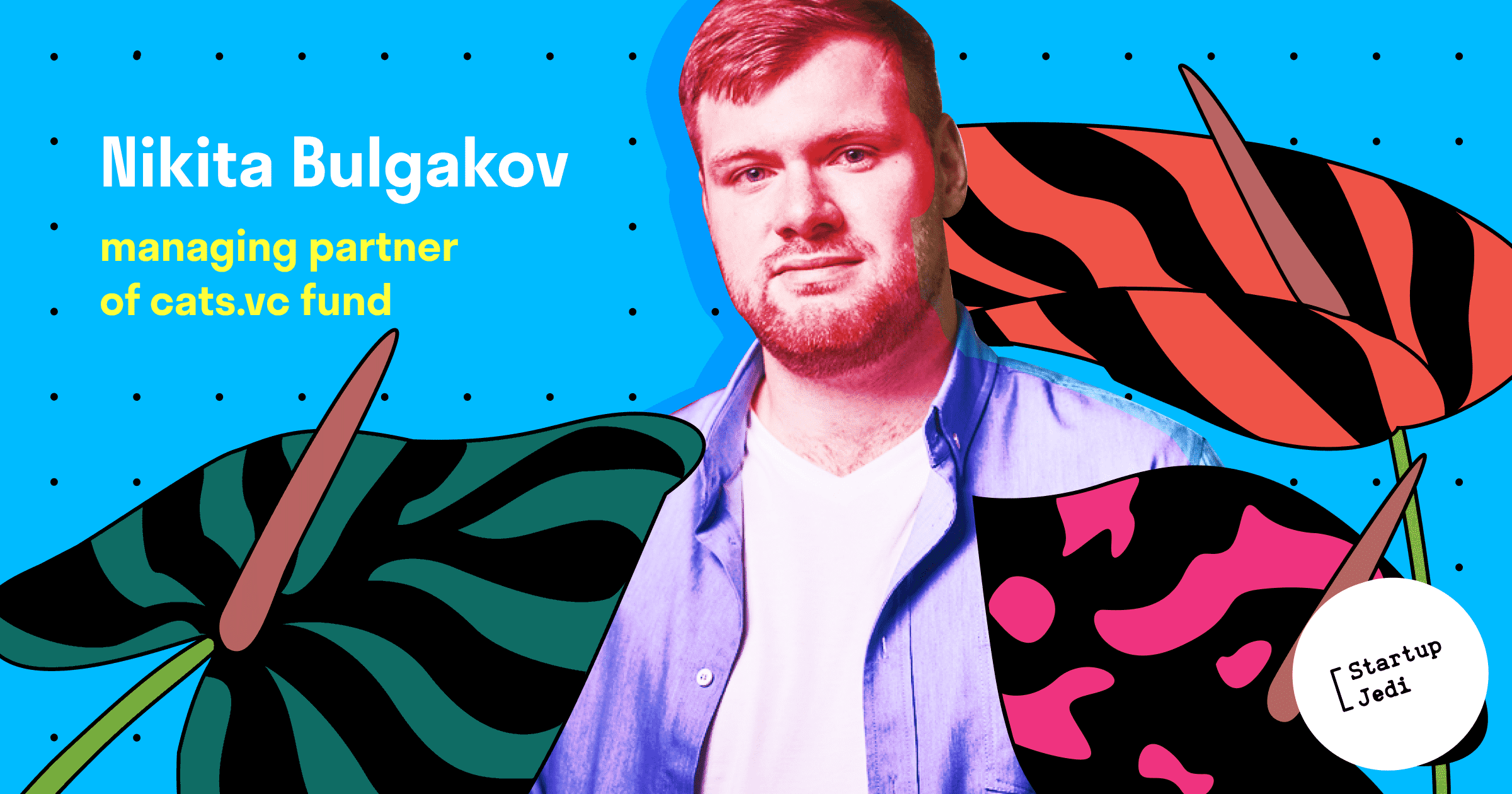
Startup Jedi
We talk to startups and investors, you get the value.
Last year was hard for lots of people, but as practice shows, hard times are really a time of opportunities. The founders of the fund with one of the most unusual names in the venture world — cats.vc — decided to use that period and launch. How does it feel to create a fund from scratch? Why was this name chosen? How does a “non-boring” venture company work? About all these facts says Max Chebotarev, Managing Partner of the fund cats.vc.

Startup Jedi
We talk to startups and investors, you get the value.
Cats.vc — deal-by-deal is a fund for business angels from Russia, as well as Eastern and Central European countries, based in Lithuania. The fund was launched in 2020 at the peak of the pandemic. At the time of preparing the interview with cats.vc, they had 3 portfolio startups, including Hassle (a FinTech service from Lithuania for corporate payments) and eAgronom (an AgroTech startup from Estonia). The average size of the check is €300 000.
...

— How was the fund launched?
— Together with our partners (Yakov Kop and Nikita Bulgakov), we had been working for quite a long time in the Internet Initiatives Development Fund (IIDF — one of the largest venture funds in Russia, managing capital of about $100M, from 2013 to 2019 they invested more than 400 companies — Startup Jedi), where each had its own areas of responsibility: Yakov was responsible for medicine, logistics and cybersport startups, Nikita — for startups related to travel and tourism, marketing tools, as for me, I was in charge of co-investments to our portfolio companies from business angels and funds. However, at some point it became clear that the restriction in the form of the Russian market is not interesting to us.
In general, if you take any country of the former USSR, then with a quite large number of investors, there are rather few exits — this is like a game with a knowingly negative result. If you look attentively at funds (Russian, Kazakh, Ukrainian or Belarusian) that have only companies with local products in their portfolio — then most likely there are no exits there.
In 2019, we began to think seriously about how to remove this restriction, and began to consider other markets. Since I studied at Stanford, I have historically had a very good network in the United States, and we had contacts of lots of companies working in the American market. But in the United States, there is very high competition: for each interested company, here are a lot of investors. On the one hand, it is quite difficult to form a good flow of transactions. On the other hand, being and living in California is not what my partners and I dreamed of.
So we looked at the markets where we had expertise and where the companies we had invested in at FRII were operating. As a result, the European market turned out to be the most attractive for us. This is the only venture capital market that is currently growing: there are a lot of clients, a lot of ecosystems, a lot of funds and interesting companies, but there is no super-high competition-especially in the early stages. This is the kind of market where you can build a good portfolio and build relationships with promising funds in order to find great startups.
It just so happens that the launch of cats.vc matched the peak of the pandemic, but we decided that there was no point in stopping here and waiting for something, so we started — from Lithuania.
— Why did you settle in Lithuania?
From the point of view of legislation, Lithuania was the most suitable for us: many things here are taken from English law and from one of the cheapest and most logical legal systems — Luxembourg. Plus, some of our investors are located here. And it should also be noted that Lithuania has a fairly well-developed startup ecosystem in a variety of areas, especially in fintech, which is very important for us.
...

— How does the deal-by-deal fund work?
— At the time of the fund’s creation, we had a good network in the CIS market: many familiar investors, funds, as well as guys who have already launched their funds. However, when we started working on cats.vc, we realized: that first — it is quite tough for a young team to raise a new fund with some new thesis; second — we as a team were not yet very well known among European institutionalists.
That’s why we took an easy way: we gathered a pool of investors and decided that we would take money from them for specific deals. Now we have about 70 investors, from whom we took soft commissions in various forms, but did not raise the fund. Because in the latter case, instead of making a deal, you go into discussion for 1,5–2 years — and this is a normal story for a venture.
Then, like any standard venture fund, we build a network with European funds and accelerators: every week we have 5–6 calls with top funds located in different places. Our main focus is the funds of Northern, Central and Eastern Europe, with which we have scheduled repeated calls: every month, every 3 months and regular exchange of pipeline projects.
Online mode, of course, slows down the process a little — it is not very convenient to build a relationship “from scratch”, and it takes from 1 to 3 months to establish a good contact. Now we have about 40 European funds in constant communication. When a company sees that we can help it, then it also shares its experience and contacts — and in the end it brings deals.
At the next stage of our work — after studying the partners’ pipeline and selecting the most attractive startups-we show prospective projects to our investors, and within 10–15 days the deal is closed. For startups, it looks like this: inside the company, the shares are managed by a fund — individual investors and angels don’t go there. At the same time, I emphasize that LP (Limited Partners) has the opportunity to choose deals and participate in them in various ways.
We are considering various industries for investment, but more interest in FinTech, Digital Health, as well as SaaS in various verticals. By now we have already closed 3 deals and 2 more are on the way.
...

— How long did it take to find investors and present the fund to them?
— We originally had an unfair competitive advantage: by the time I and my partners left the IIDF, we were already familiar with many investors in the region. So there are no people in our deals today that we haven’t crossed paths with before — accordingly, I cannot say that the search for investors takes a lot of time
When we started, we thought that we would not have enough time to search for LP and communication with them — but in practice, it turned out that it was much harder to find attractive companies that we would like. But despite the fact that we are a deal-by-deal fund, we manage the asset in the same way as in a classic venture fund.
Now we are solving the task of developing the fund: we are actively communicating with investors from Poland and the Baltic States, and we want to switch to non-Russian-speaking investors.
...

— Why are cats?
— We initially didn’t want to become a boring venture fund: we conducted a study of various domains with an ending .vc, then we thought about the existing semantic associations with cool venture funds and modern reality. And since no one knew us at that time, we somehow came up with the idea that you can take investments from the cats: it’s cool and there’s no evil in it (we have paws!) — that’s how cats.vc. was born. Also, with the help of a familiar designer, our current story was created together with an unusual website, logo and design.
In the case when the fund is given a standard name, for example, Capital Partners, an ordinary website with a typical nice and serious design is developed — it is hard to attract investments because of the large number of similar ones. For us, everything — both the name and the design works to attract attention. As a result, even cold contacts often agree to communicate — they are interested in our originality.
Therefore, the first reason is that we should have fun and enjoy ourselves, and the second reason is that the original pitch makes marketing a little easier, since we are easier to remember than most funds.
— Is it complicated to create a fund from scratch?
— Creating a fund is fascinating because of the constant development and the necessity to think about it. Firstly, in Europe there is a peculiar legislation regulating the creation of these kinds of funds, and secondly it is necessary to constantly look for solutions for companies so that they want to close with us, given that the closure scheme in the fund is not the easiest.
We regularly conduct a retrospective and realize that every week it becomes easier to work. It’s like a good hobby — you’re constantly learning something new. This is not to say that creating a fund is very simple, but it is interesting
...

— How do you search for portfolio companies?
— We want to close 1.5–2 companies per month, and to achieve this, we need to look at about 100 projects per month. Originally, we realized that we didn’t believe in the strategy of intensive search through Crunchbase and LinkedIn, so we decided to build relationships directly with the funds. A few months after establishing contact and communication, they become more loyal and deals exchange happens.
I don’t really believe in searching for companies based on online events and pitch sessions, because you’re not the first person to see a company. So, the competition will be higher there, and if your brand is not fully formed in the market yet, you are unlikely to get a good deal. So our main thing is to add to our portfolio through investor relations and through relations with companies that we have already entered.
— Did the first three companies in the portfolio also come through contacts with funds?
— We immediately chose the strategy that we will call a lot of funds and accelerators and build relationships with them. Since we are technically located in Lithuania, our first deal was with Startup Wise Guys, a fairly well-known accelerator in the Baltic States.
The following transactions came to us through the network. We can say that all the deals that have already been closed and those that we are looking at now are companies that came through the network.
— How does an ideal startup look from your point of view?
— Answer this question is the same as to tell about the ideal wife or husband-there must be several factors that coincide. The first is that there should be a “match” with the funder: you should be interested in communicating, you should be from the same cultural code. The second is how fast the company is growing and how fast the segment in which it operates is growing.
...
— Many funds bet on building an ecosystem, a community around their fund. Can this be effective for your fund?
— The formation of an ecosystem and similar things can only afford a very large fund: when a large portfolio, a lot of funders, and so on. Of course in some format it works, but our thesis is different from the thesis of many Europeans who look at companies on ecosystems. We look at companies from a wide variety of locations. Therefore, the community is good, but in our case, we rely on the formation of expertise and brand around us.
Besides, our fund is small, we are the team of five: 3 partners and 2 analysts. Our resources are limited, moreover, from the team’s point of view we don’t want to grow any more. Objectively, from the experience of working in the IIDF the deal does not bring the community, the deal brings the relationship with the people who found this company.
Many large funds in the UK and Germany act not even as funds, but as media platforms. For small funds, it is important to do the work aimed at replenishing the pipeline.
...

— How do you help projects beyond money?
— Usually investors put money into the project and that’s all. We close the check from €200 000 to €400 000 — this is 10–20% of the round, but at the same time we communicate a lot with the teams.
Even if the company is a grown-up, the founders still have quite a lot of questions about how the round is structured, how it works with investors. In addition, in the process of company development, there are many technical issues that large funds, as a rule, do not work with. And we can help both with the paperwork and the search for specialists, top managers in the team and with the network.
We are trying to spend more time with the teams, because a happy funder will bring some more friends who are also building interesting startups.
— How do you interact with investors after you have invested their money?
— We have investors who have already invested in more than one transaction. For most LP investing is a kind of entertainment, so we keep a Facebook group, and try to make it useful and interesting. As for informing companies, we send them monthly reports. We are pretty much in touch with startups — both in terms of the support we can provide and in terms of understanding what is going on inside them.
...
— What are the fund’s plans for the near future?
— Last year we had 3 deals, this year we want to close from 7 to 9 deals. In general, we want to close more, and we have already started talking about this with European institutions: what you need to do to be more attractive for them as an investment. A very large number of funds are appearing in Europe right now.
As for long-term plans, it is very difficult to plan something in the current infrastructure, (ecosystem), as everything rapidly changes. We understand that we close awesome deals that we really like, and we do cross-border expertise that — objectively-very few funds or accelerators do. Everyone is focused around their own small ecosystem, and it is very comfortable for them being there. We are doing a lot of cross-border communications and are going to establish relationships with major European investors, but I would not plan to go beyond a year.
We move in short iterations: we need good deals, and we understand why. We live in an interesting time, when the speed of change exceeds the speed of planning.
Facebook: facebook.com/StartupJedi/
Telegram: t.me/Startup_Jedi
Twitter: twitter.com/startup_jedi
Comments